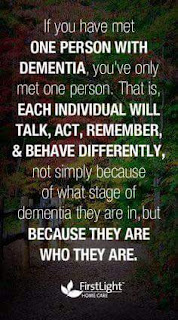Same name, different guises
Actually the heading to this post isn't quite right as dementia does have different names for it's different guises although the one thing they definitely have in common is that they all involve a progressive degeneration of brain cells that is currently irreversible. The difficulty here then is asking for and finding advice that works for your particular loved one. Some strategies will work for many people but certainly not for all and it can be hard work pinning down help for that one thing which seems peculiar to your life. As you know, if you've been reading this blog for a while, I recently read Wendy Mitchell's book 'Somebody I Used to Know' (ISBN: 9781524797911) and was amazed that she can still describe in detail what she's done during any given day. I then discovered that when she is out and about in her busy life as long as she types as she goes we can read all about where she's been and what she's been doing. If she isn't able to type 'in real time' then it's all lost as afterwards she just can't remember. This week I've read Terry Pratchett's 'A Slip of the Keyboard' (ISBN: 9780804169226) in which he talked about his version of Alzheimers and how he was no longer able to type as the keys disappeared in front of his eyes. To produce that book someone else had to do the typing yet the general view is that Wendy Mitchell and Terry Pratchett had the same 'disease' (for a slightly different view I suggest reading 'Contented Dementia' by Oliver James where Penny Garner argues that dementia in all it's forms should be viewed as a disability rather than a disease ISBN: 9780091901813). So how do we work our way through this minefield? How do we know what to do to make life easier for those we love? And let's not forget about us. If we can make life easier for those living with Alzheimers/Frontotemporal dementia/Lewy body dementia/Vascular dementia/Early Onset dementia (to name but a few) then we can also make life easier for ourselves but it takes patience, understanding and commitment beyond anything you would have thought possible. And that commitment isn't needed just from those directly affected by this situation but by everyone surrounding them; friends, relatives, local community ......... if we can persuade people to at least understand that not everyone is the same, that just because a person has dementia they don't have the same needs as the next person with dementia then we may give ourselves time to work out what's needed in our particular case and how much better we will then be able to make life for everyone involved. So that ladies and gentlemen is your challenge should you wish to take it. Go out into the world and spread the word far and wide.
Don't forget:
Don't forget:
- If you would like to follow this blog without having to think about it just hit the 'subscribe' button and look out for the activation email. The posts will then be delivered straight to your inbox.
- If you would like to contact me privately email memoryfortwo@gmail.com
- If you would like to comment use the comment link at the bottom left of the post.
- If you would like to share a post with the outside world click on the weird 3-pronged shape at the top right of a specific post and choose how to share.

Comments
It’s really difficult to explain, that every person with Dementia is an individual to begin with, and therefore will act/react to the loss of their abilities in their own individual way. There are so many variables where Dementia is concerned, it’s impossible to say the same course of action is helpful for everyone suffering from this horrible disability/disease.
But wherever possible I do try, and will continue to do so, to educate those we come in contact with. It’s so important that we talk about this...sadly, I’ve read, Dementia is on the increase. It’s not going to go away.